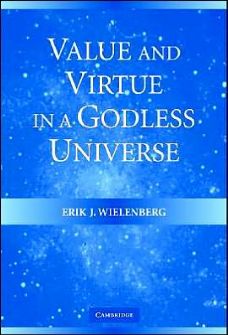In the second chapter of Value and Virtue in a Godless Universe Wielenberg critiques theistic ethics and argues for a basic account of naturalistic ethics. I will focus on the later.
God as the Source of Ethics? Naturalism as the source of Nihilism!
Some philosophers argue that God is the source of all moral duties and commands and that as a consequence of this, the naturalistic framework cannot account for objective moral values. Wielenberg argues that this is false because "we have some moral obligations that derive from our relationship with other human beings and we have other moral obligations that derive from intrinsic values." I will only focus on the first, and quickly sum up the second.
God as a Divine Commander
Many, if not most, theists believe that moral obligations arise out of Gods commands.Wielenberg contests this for two primary reasons. The first is that although God can and may be the source of some moral obligations he cannot be the source for all moral obligation. This is because for God to command an action x he must have the right credentials and go through a proper process. Divine Command theorists suggest that a person x must obey God because he is an all-good God, these are the proper credentials for an ethical command. Wielenberg has no qualms with this. But for an all-good God to command an action or moral obligation via a sign is not enough to establish a moral condition. God must make sure that the receiver of the command, understands that the sign is from her. Wielenberg illustrates this as such:
"Suppose your friend (call him "Dave") sends you an anonymous note. The note reads: "Loan Dave your Car"...Are you now morally obligated to loan Dave your car? The answer clearly enough is no, and it is not hard to see why: You have no idea who issued this command. More specifically, you don't know that the command was issued by dave. Moreover, Dave (We may reasonably suppose) knew that you would not be able to tel who issued the command. In these circumstances, it seems clear that Dave, despite being capable of imposing on you the obligation to loan him your car, has failed to do so in the case at hand. He has failed to do so because he has failed to recognize that the command is coming from a legitimate source."
So now a argument can be constructed to show that not all moral obligations derive from God's commands:
1. When issuing a command which instills moral obligation, God must show that the command comes from a legitimate source, namely, himself.
2. Naturalists have moral obligations.
3. But naturalists do not recognize God's existence, let alone her commands.
4. Therefore, God cannot be the source of all the naturalists moral obligations.
There may be some objections to 3, perhaps the naturalists does not recognize that God exists or that she has issued a command because of some moral or rational fault of their own. But it doesn't at all seem controversial to suppose that there are reasonable naturalists.That is, naturalists who are in a position where they may be epistemically justified in the belief that God doesn't exist. Well perhaps that is a bit controversial, but remember that Wielenberg assumes that naturalism is true in this book and is only seeking to establish that if naturalism is true then there exists value and virtue! He does not argue for the truth of naturalism. Thus saying that the naturalist is suffering from a significant defect (spiritual, moral, or rational) would be to beg the question of God's existence. So through all this I think one could establish that if naturalism is true there still exists moral obligation.
Necessary Moral Truths
Some things are contingent (they could or could not exist) and others are necessary (they cannot not-exist). The typical example of a necessary truths is 2+2=4. It must be the case that 2=2+4. In the same way the naturalist cannot insist that it must be the case that pain is bad. Pain may lead to good things, but it is in and of itself bad. It is intrinsically bad and it could not be otherwise. God could not make the badness of pain go be a goodness, because the badness of pain is not contingent it is necessary. Thus it is the case that the naturalist can insist on moral truths that derive are true in virtue of their intrinsic and necessary nature.
This I think constructs a basic case for the existence of moral facts in the naturalistic framework, that is quite successful.

No comments:
Post a Comment